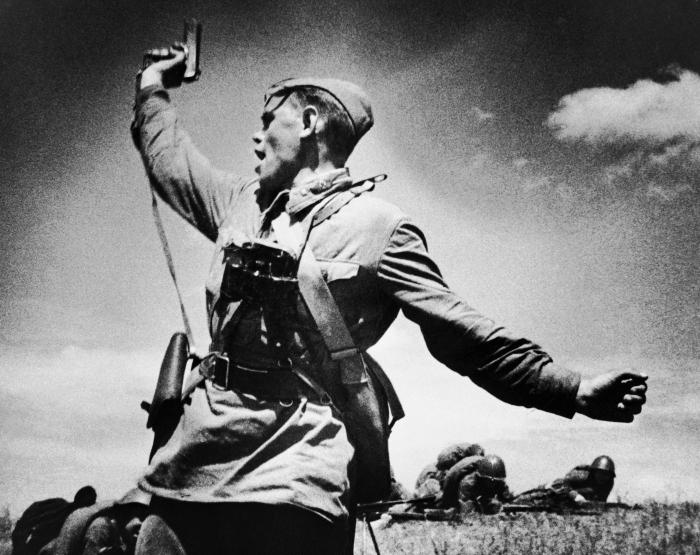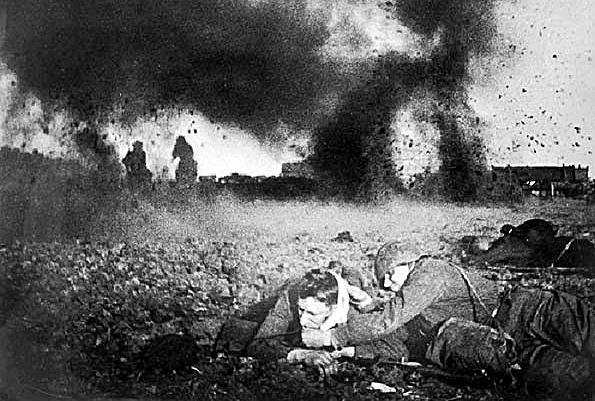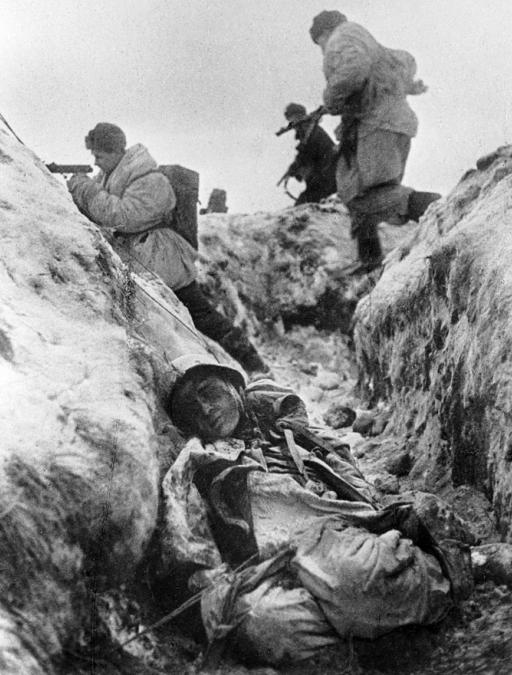A lot has been written about the Great Patriotic War . A special place in the literature devoted to this topic is occupied by the so-called “lieutenant”, or “trench” prose, which appeared in the 1950s and 1960s. These are the works of former war veterans who, through their own experience, knew the horrors of trench life and open battle. Their thoughts and feelings are very important for the reader, as they wrote about what they saw with their own eyes. Among them is the story of Konstantin Vorobyov, “Killed near Moscow,” written in 1961 and published two years later in the journal New World.
Front-line writers took the appearance of this work as a sensation. However, official circles were dissatisfied with the special author's approach to the depiction of war. As a result, the name of the writer was permanently deleted from Soviet literature, which was a real blow for him. Only in the 80s, after the death of K. Vorobyov, they talked about him again, including in connection with another, previously unpublished work on the military theme - “This is us, Lord!”
Autobiographical basis of the story
The fate of the writer can not be called simple. Even before the war, K. Vorobyov, whose childhood and youth passed in the Kursk region, ended up in Moscow. The reason was the poems written by him on the death of Kuibyshev and containing unflattering remarks addressed to Stalin. The future writer had to leave his hometown, which saved him from completely predictable consequences.
In Moscow, Vorobyov, who had a height of 1.83 m and was marked in the autobiography “From the Peasants,” was among the cadets from whom the Kremlin company was formed. This was the beginning of the tragic events that later became part of the work “Killed near Moscow.”
In October 1941, when the Nazi forces launched a large-scale attack on the capital, and the Soviet often fell into encirclement and were forced to retreat, they had no military experience, armed only with old-style rifles (they fought with them as early as World War I), young cadets, including and K. Vorobyov, were sent to the front. The task for them was clearly defined - to protect the approaches to Moscow. And then - a meeting on the way to the front with the NKVD troops, called upon to control their own in a war; the first battle near Klin, for the majority of yesterday’s cadets it turned out to be the last; captured and, finally, after several attempts to escape, a partisan underground detachment, the camps are already in their own country. All this was experienced by the writer, and then described in his very truthful and disliked to the authorities stories and short stories that for a long time became inaccessible to the ordinary reader.
Summary
“Killed near Moscow” is the story of a very short (the story covers a time period of 5 days) stay at the front of two hundred and forty young, physically strong, healthy cadets. In a slender line, everything is just like a selection, young soldiers at the beginning of the work walk towards the front line. They are full of optimism and are in an enthusiastic state due to the anticipation of future exploits. However, the reader from the first pages expects a tragic outcome - the title of the story leads to this. Indeed, after only a few days, only one of them will remain alive - the still young and inexperienced officer Alexei Yastrebov. All other 239 fighters will be killed near Moscow. An analysis of the causes of these terrible events formed the basis of the story.
As one becomes familiar with the content, the reader comes to a terrifying conclusion. In fact, everything was quite simple: young soldiers were practically used as
cannon fodder, having given up for destruction by the enemy armed forces. The author talks about how they were sent to fight with rifles, several grenades and Molotov cocktails - there weren’t enough machine guns. Initially, the actions of more experienced commanders and their analysis cause outrage. Young guys were killed near Moscow also through their fault. I recall the order to retreat, out of turmoil sent from headquarters out of shape. As a result, the time to save the guys was lost, because Ryumin, the regiment commander, who was used to everything in order, did not trust his oral transmission through an unfamiliar fighter, but was waiting for written confirmation. And also the false beliefs that reinforcements will soon arrive, which put the lives of two and a half hundred practically unarmed boys dependent on those who have long easily decided the fate of many people.
The history of the formation of the personality of Alexei Yastrebov
The main character of the story of K. Vorobyov “Killed near Moscow” is a young lieutenant who received the rank only two weeks ago and was sent for command to the cadet regiment. The reader witnesses how difficult the mourning of Alexei Yastrebov is. The new position is given to him with difficulty, he gives his first orders in a ringing uncertain voice and looks around every time, hoping to see next to him a more experienced comrade, who were the regiment commander Ryumin and political instructor Anisimov. Everything is for the first time for him - Konstantin Vorobyov focuses on this. “Killed near Moscow” is a story about events narrating about the spiritual formation of the hero. Before the eyes of the reader, an unexpectedly unfolding battle takes place. And the first murder of a German, in which Alexei at that moment sees not the enemy, but the man (the sensation of the enemy will come later, as a result of the experience). And a frightened cadet, clinging to the ground in an attempt to save himself. At first, he associated the lieutenant with a traitor, since Yastrebov did not immediately realize that he himself was behaving in this way at that moment, as he was trying to escape somewhere. It was also unclear how a cadet could ask Yastrebov to shoot him - this would save him from possible captivity. Only after some time, Alexey will understand and realize the fact that, faced with death, a person becomes powerless and capable of actions that previously caused him condemnation: to kill a friend or himself, to run away or hide in an attempt to defend himself. And the fact that the death of innocent cadets was the result of decisions made there in Moscow, whence adult men, many of whom did not know the war personally, easily sent “their” sons to death.

Thus, the psychological growth of the hero is central to the story - this is what helps to understand her analysis. “Killed near Moscow” is a unique work, because it makes one think not only about the horrors of fascism, but also about the role that the individual person and the system prevailing in the Soviet Union played in the events that took place.
Realism Vorobyov
Another advantage of the story is (this is exactly what front-line writers unanimously recognized) that it shows the war from the inside, without gloss and the desire to embellish something. As a result, shortly after publication in 1963, the story “Killed near Moscow” was included in the list of prohibited works for a long time.
What is the realism of the writer in the image of the war?
First of all, ordinary people appear before the reader: with their doubts and fears, bewilderment and despair. Their behavior during the minutes of the battle is natural: they are powerless to change anything and often do not fully understand what is happening. The feelings that everyone understands — the fear of death, the desire to protect themselves — do not at all diminish the dignity of young children, and Konstantin Vorobyov pays special attention to this. “Killed near Moscow” is not a book about those who, like Major General Pereverzev, tore off the insignia and tried to flee. Its heroes are people who recognize themselves as a part of a great nation fighting for the liberation of their homeland. The initial idea of the battlefield as a place of exploits is replaced for boys who have grown up instantly by the realization of a common misfortune, which turned out to be a terrible blow to a quiet peaceful life.

The episode with a severed leg in a boot, which first aroused bewilderment of Alexei, was naturally drawn by the author: who put it here? And it’s impossible to forget the suffering of the wounded in the stomach and dying Anisimov, who repeated everything: “Cut off ...”, and next to him, in his overcoat, “a swirling skein of something alive” is Alexei’s perception. It seems that from the pages of the story of K. Vorobyov, every soldier killed near Moscow speaks.
The role of the battle with the motorized infantry battalion
Another character important for understanding the author’s intention is Captain Ryumin, who from the very beginning was a role model for cadets. And he was quite consistent with what a real officer was supposed to be. Some of the readers may be confused by the episode in the village. Why did Ryumin need to engage in a meaningless battle, which still could not change anything, for the fate of the company was a foregone conclusion? The answer to this question is actually quite simple. Ryumin realizes that his subordinates are doomed, and gives them the opportunity to feel like real soldiers before they die. Indeed, the cadets emerged from the battle mature, feeling personal involvement in the salvation of their homeland. They did not shout loud slogans, but fully felt the happiness of their first victory. It can be argued that such a feeling was experienced by every soldier killed near Moscow, since it was a question of protecting the capital - the heart of his native country.
The final scene of the story
The last pages of the work are difficult to read. The reader witnessed how carefree, dreaming of a feat little boys grew up in five days and turned into real men, who re-evaluate themselves and comrades. Alexey Yastrebov, who witnessed many deaths and how Ryumin passed away, quite consciously grabs a bottle of incendiary death and rushes to the tank. At this moment, he is no longer afraid to die and accomplishes his feat simply and routinely, completely not thinking about him. So the price of victory is comprehended, which the soldiers killed near Moscow will not see. Alexey’s brief recollection of his native home, of his grandfather, for one moment brought him both the past and the present. Now some other truth had been revealed to him that had not been previously known about why everything was being done. The life experience gained during these 5 days completely changed his worldview, and the cruelty he saw nurtured hatred of the enemy in his soul.
The psychological component of the work
An important place in the story of K. Vorobyov “Killed near Moscow” is occupied by the internal monologues of the young Alexei Yastrebov and the more experienced company commander Captain Ryumin, who is more aware of the tragedy of the situation and considers himself involved in what is happening. The latter was brought up by the party and used to rely on theoretical calculation in everything. He believed that he was able to control the situation, but soon realized that all his ideas were an illusion. Ryumin could not stand the pangs of conscience and committed suicide. It was not his fault that it all happened, but he himself pronounced the verdict. Particularly noteworthy are the last words of the captain, which indicate the true culprit of what is happening: "Bastard! After all, all this was shown to us back in Spain! ” They contain an explicit reference to Stalin. So, in the process of development of the action, the captain’s worldview also changes, as evidenced by his actions, assessment of what is happening, thoughts and their analysis. “Killed near Moscow” is a work showing how a person passes the test of humanism in a war. It immediately becomes clear who is who.

The original version of the ending of the story
How much time has passed: a few minutes or hours - Alex did not understand. He woke up from the fact that he was dragged from the grave by strong hands, and heard German above his head and friendly laughter. "The back and ... the place on the body where the German kicked the boot was warm and reassuring for a long time ..." Alexey got up and saw the burnt ricks, in which the surviving cadets were hiding. This is the initial version of the ending of the story "Killed near Moscow." An analysis of such a finale — it was recommended that the author be redone and made more optimistic — leads to the conclusion that the first months of the war became tragic for the Soviet country. But he remained only in the archives. Vorobyov himself believed that the final version of the work reflected in no less degree the horror of what “newcomers” had to face at the front. Moreover, Alexei, escaping from the hell, was already a completely different person: seasoned, rethought a lot, able to protect those who depended on him. The open finale implies an ambiguous outcome of events, but leaves the hope that the hero will still be able to escape, and he will contribute to the Victory.
The meaning of the story
Humanism, duty, heroism, the formation of a human personality, responsibility for one’s actions, the ability to empathize and understand another - K. Vorobyov argues over these difficult concepts in his work. “Killed near Moscow” is a short story about one episode in the life of the author himself, a kind of warning that is documentary, sometimes even confessional. What happened in the formidable forties - this is the main idea of the author - must not be forgotten in any case.
Features of "Lieutenant" Prose
The works created in the 50-60s differ from those that were written during the war years or immediately after its end. A detailed analysis is added to the description of the events. “Killed near Moscow” is no exception. V. Astafyev noted that the story cannot be read just like that, it cannot leave anyone indifferent. From her fists clench and the only desire arises: that this never happens again. This is an admission that K. Vorobyov was able to fully demonstrate the anti-humanity of such a confrontation, to make you think about how much a human life costs. And yet - to determine the role in the war of all the forces that were related to it, including the state and its leadership.